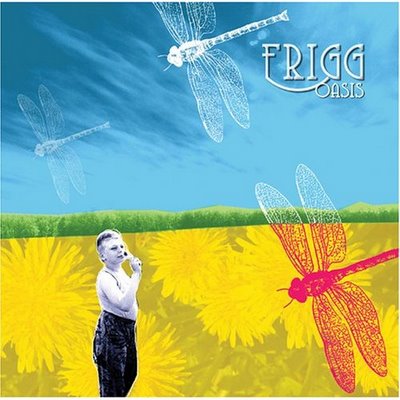
When NorthSide released Frigg's delightful self-titled debut album in 2004, it marked the emergence of a new generation of musicians from a pair of prominent fiddling families from Finland and Norway. Now Alina (fiddle), Esko (fiddle and keyboards), and Antti (bass and fiddle) Järvelä; Gjermund and Einar Olav Larsen (fiddle and Hardanger fiddle); Tuomas Logrén (guitar and dobro); and Petri Prauda (mandolin, cittern, Estonian bagpipes) have returned with a new CD Oasis. Happily, Frigg's sophomore effort exceeds its predecessor by quite a bit, with tighter playing, a more diverse sound, and some ambitious arrangements and original compositions.
The basic Frigg sound, as defined on the debut CD, consists of a wall of fiddles reminiscent of JPP (a band which Antti Järvelä has just recently joined on bass) but backed instead by the strumming of the guitar and cittern, with a touch of dobro providing a distinctively bluegrass flavor. Some of Oasis follows a similar pattern, but the band explores some different musical styles. Antti Järvelä's schottis "Jokijenkka (Riverdance)" would not sound out of place played as an Irish polka at a ceilidh, for example. With "Hasse," Frigg puts its own stamp on one of Väsen's best recently composed polskas. "Fantomen" and "Solberg" are straightforward polkas, provided you play them at about a third of the speed that Frigg plays them here.
At other points on the album, the band makes marked departures from its original sound, with excellent results. The gorgeous title tune "Keidas (Oasis)" was composed in 5/8 meter by Prauda for a school project. Its most poignant moment comes when the third part of the tune is played by a solo fiddler. Logrén's "Tepeq" features some brisk interplay between a guitar and mandolin. The most significant addition to Frigg's sound on Oasis, though, comes from Prauda making his recording debut on Estonian bagpipes; he explained at a concert that he felt Finland needed a bagpipe tradition of it's own. The pipes magnify the urgency of the waltz "Mäenpään Heikin Valssi" and the emotion of the album's closing track, the traditional funeral march "Peltoniemen Hintriikin Surumarssi ."
For a young band, Frigg shows a remarkable depth and maturity in their arrangements and compositions. And they play pretty damn well, too. I see no reason why this Finnish/Norwegian ensemble shouldn't continue to make albums of this high quality for the indefinite future.
For information on Frigg's summer 2006 North American tour, please click here.
Overall grade: A-

Reprinted with permission from The Green Man Review
Copyright 2006 The Green Man Review



No comments:
Post a Comment